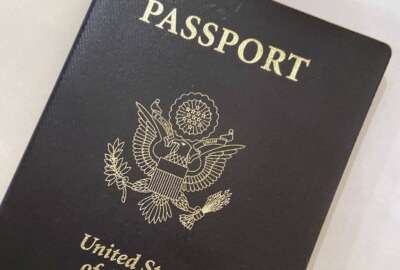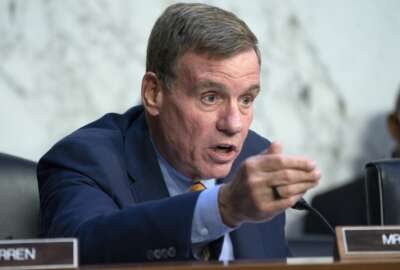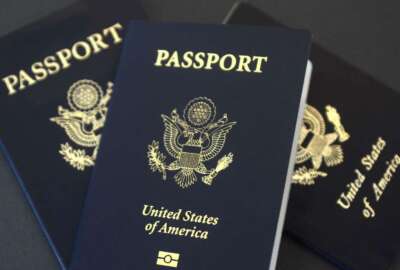Fed up with the State Department’s passport delays? So are its employees
The State Department is on track to issue a record-breaking number of passports this year, but is still dealing with a major backlog of applications and...
The State Department is on track to issue a record-breaking number of passports this year, but is still dealing with a major backlog of applications and higher-than-average wait times.
During the peak summer travel season, the department is taking 10-13 weeks for routine passport processing. Expedited processing (which costs an extra $60, on top of a $130 application fee) takes about 7-9 weeks.
A State Department spokesperson told Federal News Network last month the department plans to return to pre-pandemic processing times by the end of the calendar year. But until that time, the department doesn’t have many options to immediately ramp up its productivity.
Its Bureau of Consular Affairs is in the process of hiring hundreds of additional passport specialists, but those applicants have to go through a lengthy federal hiring process, further complicated by the need to obtain a security clearance to handle sensitive documents.
The department is also looking to fully launch an online passport renewal platform by the end of this year, or early next year, after soft-launching the platform in late 2022 and earlier this year.
Lawmakers have written several letters complaining about the delays — and have introduced legislation to remedy the situation.
National Federation of Federal Employees Local 1998 President Lee Wentz said in a recent interview that passport services employees are also frustrated by these delays.
“We’re all here doing what we can to help everybody. And if we were on the other side of the coin … I’d be frustrated too. We all totally get that, we totally understand it. But at the same time, from the employee standpoint, we’re doing everything we can to help everybody,” Wentz said. “It would be nice if we could get everybody a passport in six-to-eight weeks, which we’ve done in the past. But when you hit unexpected requests for product, it’s hard.”
NFFE represents about 1,300 passport services employees.
Between January and June this year, the Bureau of Consular Affairs authorized between 30,000 and 40,000 overtime hours each month. Wentz said most of that overtime is voluntary, and that passport services employees are willing to put in extra hours when needed.
“If management says we need everybody to step up, it’s everybody’s responsibility to step up and do it,” Wentz said. “We’re meeting the expectation of what we should be doing to meet the overtime demands. Having to work overtime every day can be a struggle. We want to do the job we get paid for, to help everybody get a passport. I’m not trying to sugarcoat it — it’s exhausting, but at the same time, we’re getting paid to do the job.”
Lawmakers have grown frustrated with the State Department for not doing more to prepare for a surge in passport applications each summer. But Wentz said the department is getting an unprecedented “tsunami” of new applications that is unlike anything its workforce has had to deal with before.
“This has been beyond normal. I don’t even know what to call it anymore,” Wentz said. “I know everybody’s frustrated, but this is abnormal — [it’s] beyond expectations, the number of applications that we’ve received in the last year. I’m not sure if anybody could have seen it coming. We knew it was going to be big, but this big? Hard to say.”
The bureau hired 177 new passport adjudicators this year, growing its workforce by about 10% — and it’s looking to grow its workforce by an additional 10%.
The State Department is also deploying “surge teams” of volunteers, including retirees and new hires, to process passports before reporting to other assignments. The department, however, is facing hiring delays because new passport adjudicators need security clearances before they can start working.
“The ‘for hire’ sign is out. And the question is, how many people want to come and work for the passport services and the Department of State?” Wentz said.
Wentz said mid-July is typically when the department sees a lower volume of new passport applications, but he said it’s too soon to know whether employees have seen a decrease in the number of new applications.
“[I’m] not saying this year is typical, by any means, because clearly, it’s not typical,” he said. “That is definitely the question — how long can we continue on, at the pace that the American public would like us to do, to give them their passport? It’s a hard line to walk, because we don’t want to burn out, we want to be all able to keep working.”
Despite the frustration felt by some customers, others say they appreciate the extraordinary measures passport services employees have taken to help them meet their international travel plans.
David Asher, a resident of Richmond, Virginia, speaking outside the Washington Passport Agency in downtown D.C, said he was able to get an emergency walk-in appointment after reaching out to his congressional representative.
“The people who work here at the Washington Passport Agency work really hard, they’re doing a great job. I’ve seen a lot of different parts of government that really don’t work so well, so kudos to them,” Asher said.
Asher said he reached out to the office of Rep. Rob Wittman (R-Va.) after he realized, about a week out from a trip to speak at an international conference of rabbis in Montreal, that his passport expired earlier this year.
“I was making my arrangements and then had this uh-oh moment, where my passport has expired,” Asher said. “I was really stuck in a bind, and government worked well for me. Everybody likes to criticize the government, but it worked out pretty well for me this time. I went to my congressman, told him I messed up, and he was able to get me an appointment [at the] last minute.”
Asher said passport services employees told him he’d be able to pick up his passport about three-to-four hours after completing his appointment.
“I’ve been hearing from other people inside that have been waiting a long time, but I really can’t complain,” he said.
The department plans to bring its online passport renewal system back online in January 2024, after rolling the platform out as a six-month pilot.
The department began testing an online passport renewal option in February 2022, and invited federal employees and contractors to apply. Between February and August 2022, the department received 10,000 online passport applications.
Wentz said the union has repeatedly called on the department for modernized IT to “efficiently [and] fruitfully help the American public.”
“We’ve said for years that we would hope that a systems upgrade would happen. We feel that’s one of the areas that would help us help everybody else,” Wentz said. “Our major focus, as of late, has been trying to upgrade our systems, to have the best, top-of-the-line systems that we can have to do the job.”
The State Department set a record last year when it issued about 22 million passport books and cards last year. But the department is on track to break that record and issue about 25 million passport books and cards this year — about a 15% increase from last year.
The spokesperson said the department is seeing fluctuations in its backlog, and is unable to provide an overall total backlog.
State Department Principal Deputy Spokesperson Vedant Patel told reporters on July 27 that the demand for passports is the highest it’s ever been, and that current wait times “are a reflection of the demand.”
“The post-pandemic spike in passport demand from Americans truly is unprecedented, and we will be on track to issue more passports this year than in any previous year, but we’re also taking steps to ensure that we can meet this demand as well,” Patel said.
Patel said passport adjudicators have been back in the office since June 2020, and that hundreds of additional staff are in the hiring pipeline.
“This is going to be a turning of a dial a little bit, not exactly flipping a switch. But the State Department certainly understands the seriousness of this, and that’s why we are not just surging staff, surging overtime hours, but we’re also thinking through ways in which we can make this process easier and more accessible for Americans,” he said.
Nearly Useless Factoid
The only insect that can turn its head is the praying mantis.
Source: National Geographic
Copyright © 2025 Federal News Network. All rights reserved. This website is not intended for users located within the European Economic Area.
Jory Heckman is a reporter at Federal News Network covering U.S. Postal Service, IRS, big data and technology issues.
Follow @jheckmanWFED
Related Stories
State Dept surges hiring amid ‘historically high’ demand for passports to drive down wait times






